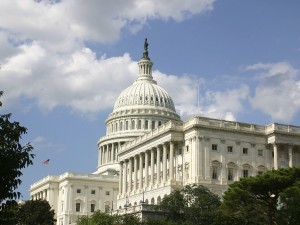This week the Senate Appropriations Committee released draft federal fiscal year 2023 (FY23) spending proposals, including legislation that would provide funding for the Carl D. Perkins Career and Technical Education Act (Perkins V). In addition, Congress passed economic competitiveness legislation while Senate Democrats announced a new reconciliation deal focused on healthcare and energy policies. Elsewhere the U.S. Department of Education (ED) unveiled newly proposed postsecondary regulations.
 Senate Appropriations Committee Releases FY23 Spending Proposals
Senate Appropriations Committee Releases FY23 Spending Proposals
The Senate Appropriations Committee released draft proposals for each of the 12 annual federal fiscal year 2023 spending bills that compose the federal budget late last week. This release comes ahead of the upcoming start of FY23, set to begin on October 1. The Senate proposal envisions a total investment of $1.44 billion for the Perkins V basic state grant program– an increase of $60 million over current FY22 enacted appropriations. The Senate’s recommended increase in funding for state grants authorized by Perkins V exceeds an earlier FY23 proposal from the House, which contained an increase of $45 million for the program. While these proposed investments in CTE are encouraging and far exceed what the Biden Administration has proposed for the program to date, Advance CTE and its partners are continuing to advocate for a $200 million increase in Perkins V state grant funding to fully meet the needs of learners throughout the nation in the coming federal fiscal year.
The Senate’s FY23 proposal for Perkins V also recommends $60 million in additional funding for the law’s national activities account– an amount intended to support the Biden Administration’s “Career Connected High Schools” proposal. Advance CTE has previously shared concerns about this proposed competitive grant program and has urged lawmakers to use this funding for Perkins V state grants which would more equitably distribute funding and support a far larger number of the nation’s CTE learners. In addition to these suggested changes in funding for Perkins, the Senate’s FY23 funding proposal also recommends a five percent increase for Student Support and Academic Enrichment state grants authorized by Title IV-A of the Every Student Succeeds Act. For core Workforce Innovation and Opportunity (WIOA) formula programs administered by the U.S. Department of Labor, the Senate is proposing a nearly six percent increase for these programs above FY22 enacted levels.
While the release of these spending proposals is an important step in the wider federal budget and appropriations process for FY23, Advance CTE does not expect the Senate to formally consider these proposals further. Instead, these proposals have been released to serve as a negotiating tool between the House and Senate to resolve differences between both chambers’ visions for the coming fiscal year and complete the FY23 budget. As these efforts continue, Advance CTE will continue to advocate for a robust investment in CTE as part of the annual federal appropriations process. All spending proposals released by the Senate last week can be accessed here.
Senate Leaders Announce Reconciliation Deal
After over a year of off-again-on-again negotiations among Democratic leaders, Senate Majority Leader Chuck Schumer (D-NY) and Senator Joe Manchin (D-WV) announced that they had reached agreement on the Inflation Reduction Act of 2022. If enacted, the legislation would make investments to expand the nation’s energy production capacity and expand healthcare access. These proposals would be funded through the establishment of a minimum corporate tax rate of 15 percent, allowing for Medicare to negotiate drug prices, and other revenue generating provisions. As a result, the legislation is also intended to reduce the federal deficit by approximately $300 billion. First conceived as President Biden’s Build Back Better Act, this legislation initially proposed to invest significant new funding in CTE and workforce development. However, continued disagreement within the Democratic Congressional caucus forced this earlier proposal to be pared back considerably over the last year. Using the reconciliation process allows Senators to advance this legislation by a simple majority in the upper chamber, thus circumventing a likely Republican filibuster of the legislation. The Senate is expected to begin this process this week ahead of the start of its annual August recess scheduled to begin this upcoming weekend.
Congress Approves CHIPS+ Proposal
As shared last week, Senate leaders announced a significantly pared back legislative proposal aimed at investing in the nation’s advanced manufacturing capacity in critical sectors of the economy related to the production of semiconductor chips. Since that time, the Senate advanced this legislation out of the chamber by a wide bipartisan vote margin which was quickly followed by a comparable vote in the House. With the package now having cleared both Congressional chambers, the bill now heads to President Biden’s desk for signature and enactment. Advance CTE and its partners had been working to include provisions that would have expanded federal Pell Grant eligibility to high-quality, shorter-term CTE programs as well as to make critical improvements to the nation’s collection of postsecondary education outcomes data. However, lawmakers were only able to find consensus on this narrower package.
ED Releases Proposed Postsecondary Regulations
Following two negotiated rulemaking convenings this past fall and spring, the U.S. Department of Education (ED) published proposed regulations on several topics, including federal Pell Grant eligibility for incarcerated individuals and the way for-profit postsecondary institutions must calculate the amount of their revenue from non-federal sources (known informally as the 90/10 rule). The newly proposed rules would strengthen requirements that postsecondary institutions obtain at least 10 percent of their revenue from non federal resources by expanding what would be “counted” as part of this share of their revenue. In addition, the proposed regulations would codify the processes for which individuals who are in correctional facilities may access and use federal Pell grants for qualifying programs. A factsheet on these changes can be found here. ED is soliciting feedback from the wider public for the next month as it works to finalize these proposals.
Steve Voytek, Policy Advisor


